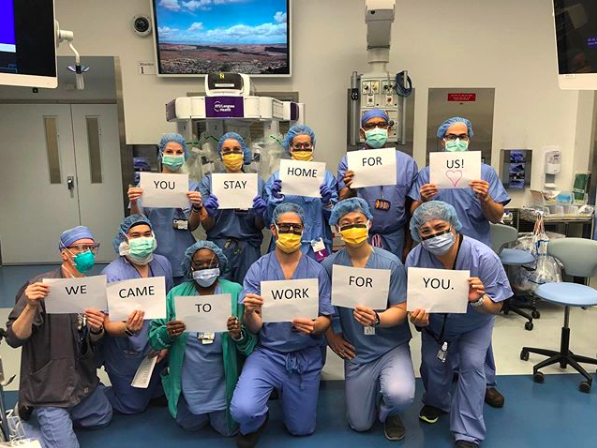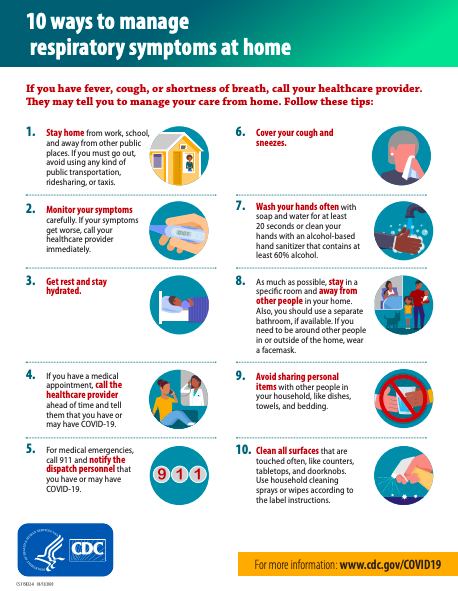Taking Care of Those Sick With Coronavirus In Cramped Quarters


A lot of people in Brooklyn are living in tiny apartments with roommates, or with extended families, often “doubled up”. As the pandemic spreads, more people who are not “very sick” are asked to stay home – the latest numbers as of this morning put the diagnosed sick at over 1,500 in just Brooklyn. Only a fraction of the ill are hospitalized, but having someone with COVID-19 at home could mean endangering an auntie or grandma who may have higher risk factors.
We reached out to doctors at NYU Langone Hospital–Brooklyn who kindly took the time to share their advice. All links are to the Center For Disease Control (CDC) information for ease of reference.
Symptoms
First off – know the symptoms. COVID-19 is associated with temperature, cough and shortness of breath. While it is easy to tell if you have a temperature (anything over 100.4F) and cough, how do you know if you have shortness of breath?
“It’s a feeling you have when you lose your breath, sometimes it is the feeling you get after significant exertion,” says Dr. Jorge Mercado, Assistant Chief of Pulmonary and Critical Care at NYU Langone Hospital–Brooklyn. “When you get that feeling at rest or with minimal activities, that raises a flag.”
CDC recommends that “if you are caring for someone at home, monitor for emergency signs, prevent the spread of germs, treat symptoms, and carefully consider when to end home isolation. Older adults and people of any age with certain serious underlying medical conditions like lung disease, heart disease, or diabetes are at higher risk for developing more serious complications from COVID-19 illness and should seek care as soon as symptoms start.”
Call your doctor for advice.
If you do not have a primary care doctor, you can start by calling #311. Using a home-based resource, like Virtual Urgent Care at NYU Langone Hospital – Brooklyn, can also connect you directly with a physician using your home computer or a mobile device. The healthcare professional will advise you whether to go to the hospital or stay home and monitor for more severe symptoms.
For all of those anxious about taking care of your friends and family, and trying to limit exposure and manage stress, here’s what the doctors recommend, and we are grateful for them taking the time to share their advice.
Elizabeth J. Haines, DO, is the Assistant Chief of Service of Pediatric Emergency Medicine at NYU Langone Hospital–Brooklyn, and offered her thoughts on the following questions:
- Can I take care of my kids if I am sick? If you are sick or having symptoms consistent with Coronavirus, you should isolate yourself from others, including children. This means finding a closed off area of your house to remain in, alone. For many parents who are the sole caregiver, this would not be possible. There is also a chance you may have spread the virus to household contacts and children before symptoms became evident.
- Should the same person care for the sick each day? Yes, this would limit the amount of exposure. Limiting exposure, limits further spread.
- Should those who care for the sick wash clothes daily? Machine wash after use, do not share with others who are sick.
- Ibuprofen or Tylenol for temperature? – The recent recommendations [from the World Health Organization] were based on very limited research. For children under 6 months, continue to use Tylenol (acetaminophen).
- How to stay sane in the midst of it? Try to make a schedule. Schedules help us feel less anxious and feel more in control of what is coming next in the day. Certainly, now we are all having major changes to our daily schedules. Despite these changes, I try to encourage others to make a loose schedule of new things. Remember to include things like meals, time in the fresh air (if possible), and checking in with friends or loved ones (virtually).
We asked Stephanie Sterling, MD, MPH, Chief of Infectious Disease and Hospital Epidemiologist at NYU Langone Hospital–Brooklyn how to protect ourselves while living with a sick housemate. Doctor Sterling says:
“The best way to protect yourself with a sick housemate is to do the absolute best you can to separate your spaces. This can be very hard, especially if that housemate is your husband! But the goal is to minimize the transmission of the contagious droplet particles from the sick person to you.
“The best way to do this is to separate living spaces as much as possible. Each person needs to wash their hands. A lot. And well. The 20-second rule helps. Clean commonly touched surfaces, such as doorknobs, toilet handles, faucets, frequently with bleach-based products. Do not share cups or utensils. Work hard to not touch your face. Clean your phone case and screen often as well.
“The sick housemate should try and isolate himself/herself as much as possible. If the sick housemate has a cough, s/he should wear a mask until the cough has completely resolved.
“Gloves can definitely help decrease what you can pick up in your environment. The best way to use gloves would probably be when you are in the living area of the sick housemate. Make sure to take them off in the appropriate way so you do not contaminate yourself while removing them! There are online videos that can demonstrate appropriate doffing technique for removing masks and gloves.
“Lastly, you, even if you feel healthy, have a sick housemate that could have been transmitting the virus even a couple days before s/he started feeling sick. This means, unfortunately, that you have likely already been exposed. For that reason, you should minimize your time outside for the following two weeks because you too may transmit the virus to someone else before you feel sick. I think you, the healthy person, should go outside for walks and fresh air. When doing that, it is important to wear a mask so that you don’t knowingly transmit the virus to someone else.
How would she advise us to protect those in the apartment that may be more vulnerable than the person that’s sick? How big a distance to keep from the sickbed?
This infection is passed by droplets that are propelled when the sick person coughs or sneezes. Droplets don’t travel very far and tend to fall within a set distance from the sick person. For this reason, if the sick person is not wearing any mask, the advice is you need to stay at least 6 feet (or 2 meters) away from that person. If the vulnerable person absolutely needs to be closer, this should only be done with the protection of gloves, a surgical mask, and an eye shield.
An additional layer of protection, regardless of keeping a six-foot space between the two people, is for the sick person to also use a surgical mask. This will help prevent infectious droplets from being spread into the environment. Another key protective effort is frequent hand-washing for everyone in the home and frequently cleaning commonly touched surfaces. These steps, when done together, can help decrease the chances of the vulnerable person getting sick from someone within the home.

Other advice from experts at NYU Langone Brooklyn echoes CDC guidance:
- If you are asymptomatic, you should self-quarantine in your home.
- Practice social distancing within the home as much as possible.
- Monitor your symptoms and contact a doctor via Virtual Urgent Care should any symptoms present.
- If you have symptoms and have already been seen by a physician, you can return home in accordance with your physician’s guidance. However, if someone in your home is pregnant, elderly, or immunocompromised, accommodations should be made to separate these individuals. Assuming no other household members are in a high-risk category and your physician agrees, you should be able to stay at home as long as you can sleep and spend most of your time in a separate room (ideally use a separate bathroom as well).
- Avoid any interactions that could lead to droplet conveyance.



